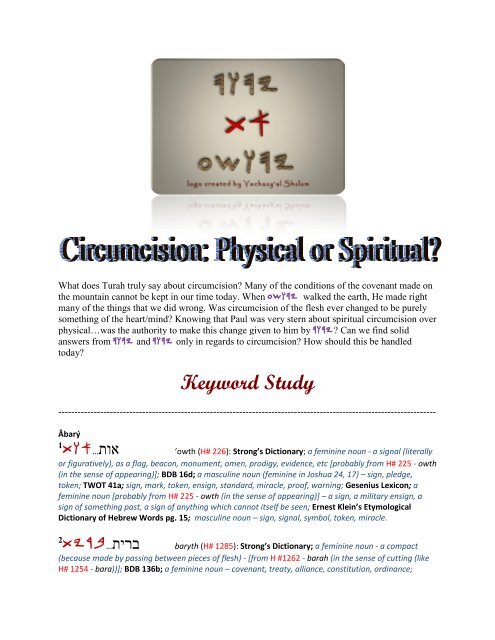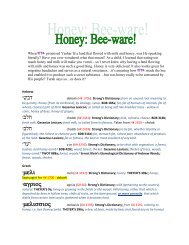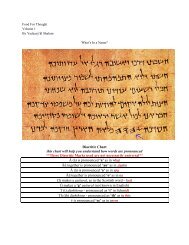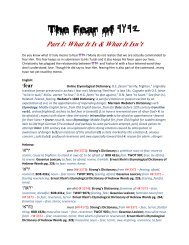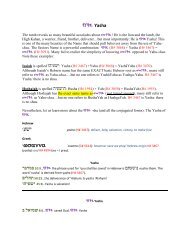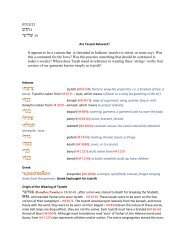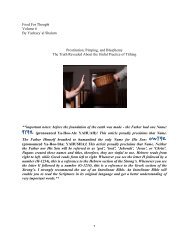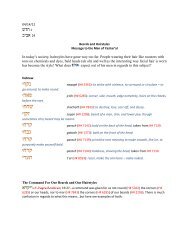Circumcision - Yahuah Is Life
Circumcision - Yahuah Is Life
Circumcision - Yahuah Is Life
Create successful ePaper yourself
Turn your PDF publications into a flip-book with our unique Google optimized e-Paper software.
What does Turah truly say about circumcision? Many of the conditions of the covenant made onthe mountain cannot be kept in our time today. When [vwhy walked the earth, He made rightmany of the things that we did wrong. Was circumcision of the flesh ever changed to be purelysomething of the heart/mind? Knowing that Paul was very stern about spiritual circumcision overphysical…was the authority to make this change given to him by hwhy? Can we find solidanswers from hwhy and hwhy only in regards to circumcision? How should this be handledtoday?Keyword Study---------------------------------------------------------------------------------------------------------------------Âbarý1אות…twa ‘owth (H# 226): Strong’s Dictionary; a feminine noun - a signal (literallyor figuratively), as a flag, beacon, monument, omen, prodigy, evidence, etc [probably from H# 225 - owth(in the sense of appearing)]; BDB 16d; a masculine noun (feminine in Joshua 24, 17) – sign, pledge,token; TWOT 41a; sign, mark, token, ensign, standard, miracle, proof, warning; Gesenius Lexicon; afeminine noun [probably from H# 225 - owth (in the sense of appearing)] – a sign, a military ensign, asign of something past, a sign of anything which cannot itself be seen; Ernest Klein’s EtymologicalDictionary of Hebrew Words pg. 15; masculine noun – sign, signal, symbol, token, miracle.2ברית…tyrb baryth (H# 1285): Strong’s Dictionary; a feminine noun - a compact(because made by passing between pieces of flesh) - [from H #1262 - barah (in the sense of cutting (likeH# 1254 - bara))]; BDB 136b; a feminine noun – covenant, treaty, alliance, constitution, ordinance;
TWOT 282a; covenant; Gesenius Lexicon; a feminine noun – a covenant, so called from the idea ofcutting since it was the custom of making solemn covenants to pass between the divided parts ofvictims..can also mean a meal to enter into a covenant; Ernest Klein’s Etymological Dictionary ofHebrew Words pg. 85; masculine noun – covenant, treaty, and alliance.3מול…lwm mul (H# 4135): Strong’s Dictionary; a primitive root/verb - to cut short,i.e. curtail (specifically the prepuce, i.e. to circumcise), (by implication) to blunt, (figuratively) to destroy;BDB 557d; verb – to circumcise, cut off; TWOT 1161; circumcise, let oneself be circumcised, be cut off;Gesenius Lexicon; a primitive root/verb – to cut off, to be circumcised, to circumcise oneself; ErnestKlein’s Etymological Dictionary of Hebrew Words pg. 324; to circumcise.מל4מ lmm…mamal (H# 5243): Strong’s Dictionary; a primitive root/verb, to becomeclipped or (spec.) circumcised; BDB 576c; verb - same as mul, circumcise; TWOT 1161; circumcise, letoneself be circumcised, be cut off; Gesenius Lexicon; a primitive root/verb, to cut off, to be cut off;Ernest Klein’s Etymological Dictionary of Hebrew Words pg. 324; to circumcise.---------------------------------------------------------------------------------------------------------------------Topic Study<strong>Circumcision</strong> of the Flesh Was an Everlasting Covenantבראשית…tyvarb (B-r‘ashyth/Genesis) 17:1-14, 23-27…hwhy said that circumcision (H# 5243)was a mark (H# 226) of the covenant (H# 1285) for our flesh…He specifically said that we are to guardthe covenant of circumcision. Verse 13 states that those circumcised (H# 4135), would have thecovenant of hwhy in their flesh. Verse 14 states that the one who is not circumcised in the flesh shall becut off and has violated the covenant. This covenant (H# 1285 – baryth) was made by cutting flesh,which subsequently produces the spilling of blood. Much like the ‘cutting’ of the covenant we readabout in B-r‘ashyth /Genesis 15:8-17, this covenant was made by cutting; a very accurate depiction ofhow many covenants came to be.I believe it is important to really take note to B-r‘ashyth /Genesis 17:14: “An uncircumcised male childwho is not circumcised in the flesh of his foreskin, his life shall be cut off, he has broken My covenant.”If hwhy said those not circumcised in the flesh are covenant breakers, and never gave a word changingthis ordinance, why did Paul say that circumcision means nothing? In his letter to those at Korinthos(Paul only wrote letters, his writings were not the Turah of hwhy) Paul clearly says that circumcisionmeans nothing (I Corinthians 7:19). Many stand on the writings of Paul as Turah, they even choose himover hwhy and [vwhy…but a deeper look into this letter in I Corinthians reveals something wrong. ICorinthians 7:12-24 actually has Paul stating that the words following were from him and not [vwhy.He states that unbelieving spouses are made set apart by the one who believes and that each personshould remain in the same state he/she is in when called. If you are married to a non-believer, stay thatway. If you are uncircumcised…stay that way. None of these statements are in line with Turah…but in all
fairness, Paul made it know that these were his orders (verse 17). Physical circumcision means nothing?hwhy said it was the mark of the covenant.Seeing that Abraham faithfully obeyed the command of hwhy and bore the covenant in his flesh at theage of 99, what are we to make of Romans 4:7-15? Paul explains that faith was reckoned unto Abrahamfor righteousness while in a state of un-circumcision, and that the mark of circumcision was a seal of therighteousness of the faith. However, in B-r‘ashyth /Genesis 17:11, hwhy said that the mark ofcircumcision was a sign of the covenant…not a seal of the righteousness of faith. Paul explains that faithwas found in un-circumcision…he never mentions that circumcision didn’t make Abraham faithful, itmade him obedient…which in turn proved his faithfulness.<strong>Circumcision</strong> of the Flesh Was A Condition for Pasachשמות…twmv (Shamuth/Exodus) 12:43-49…the importance of the Pasach amongst Yashar῾ål trulyneeds no explanation. It was so important that it is the only one of the mu’adym that we were given a‘make up’ day to take it (B-mdbar/Numbers 9:9-14). The Pasach was extremely important…yet nouncircumcised male could eat of it and there was no make-up day for Pasach for those not circumcised;no uncircumcised male could eat of the Pasach of hwhy. This passage is speaking 100% of a physicalcircumcision.After passing over the Yardan, Yahusha Bn Nun was instructed to circumcise all males that were notcircumcised before the Pasach. In Yahusha Bn Nun 5:2-11, a second circumcision was administered forthose who had been born in the wilderness and had not carried the covenant of hwhy in their flesh. Indoing so, hwhy said that the reproach/scorn/shame of Matsraym was rolled away…is physicalcircumcision still so important today that by not having it done we could still bear the scorn/shame ofMatsraym?<strong>Circumcision</strong> of the Flesh Did Not Cease in the Time of [vwhyNor Was a Command Given to Do SoLuke 2:21…as the command for circumcision of the flesh was not changed during the time of [vwhy,He was circumcised on the eighth day (according to the command) and carried the covenant of hwhy inHis flesh. We know that Yahuchanan was to prepare the way for [vwhy, he also was circumcised (onthe eighth day) – thus carrying the covenant of hwhy in his flesh (Luke 1:59 & 60). In Yahuchanan/John7:21-23, to show an example of righteous judgment, [vwhy made the comparison of Him healing onShabath versus the fact that men would even circumcise on the Shabath in order to keep the Turah.There was no command given by [vwhy from hwhy to end the physical act of circumcision…so wheredid this doctrine come from?The Four Necessities - Words of Man, and Not the Word of hwhyIn Christianity, there is a term that you may be familiar with – I believe it is referred to as ‘the fournecessities.’ This is basically the four things that you must do to inherit salvation as a ‘New Covenant’believer. The scary thing about these four necessities is that they did not come from hwhy, but from fourmen.Acts 15:1-29…because of a dispute about circumcision, the introduction of the four necessities wasgiven by Yʿâqb, not hwhy. <strong>Circumcision</strong> was basically suspended by the elders, Paul, Kaph, Yʿâqb, and
Barnabah. This was done as not burden new converts. Could this be what Yahuchanan was referring toin Yahuchanan Alaph/I John 5:2 & 3? Though the brothers agreed to lay not greater burden on newconverts, Paul would go on to circumcise Timothy (Timothy was bi-racial; half Greek and half Yahudy) toappease the Yahudym, for they apparently still believed in circumcision (Acts 16:1-4). Verse 4 statesthat Paul gave orders on what laws should be kept…the ones that were decided by the emissaries in Acts15.In Acts 21:18-25…after the four necessities are mentioned again, Paul he would later go on to bearrested, being accused of teaching others against the Turah. Did hwhy truly instruct Paul and theothers to give a different set of rules to new converts? Did not hwhy say ‘One Turah for the native andfor the stranger,’ in B-mdbar/Numbers 9:14 and Shamuth/Exodus 12:49? Or was Paul truly set as astumbling-block for the nations?<strong>Circumcision</strong> of the Heart/Mind Was Not a new Testament ConceptIt Was Spoken of Long Before PaulIn Romans 2:17-29, Paul speaks to the hypocrisy of those in Rome, the latter of the verse addressesYahudym. He speaks well to their hypocrisy, but then, his summarization goes directly against thecovenant found in B-r‘ashyth/Genesis 17:9 & 10. In verses 25-29 to solidify this ideology, Paul is nowspeaking against the covenant of circumcision that was commanded to be outward – in the flesh. Andwhat of circumcision of the heart? hwhy speaks of both physical and spiritual (of the heart). InDabarym/Deuteronomy 10:16, as Mashah is speaking to Yashar῾ål the words that hwhy said to him, heplainly says, ‘and you shall circumcise your heart and harden your neck no more.’ Knowing that YahushaBn Nun physically circumcised all the males after Mashah died, and knowing that [vwhy was alsocircumcised, we see that hwhy spoke of both physical and spiritual (of the heart/mind). InDabarym/Deuteronomy 30:1-7, we read once again of the circumcision of the heart…it was never areplacement for circumcision of the flesh…it goes hand and hand with our return to Turah(YaramYahu/Jeremiah 4:4), and the Turah has commanded a physical circumcision.If Paul had read YaramYahu/Jeremiah 9:22-26, would his position on circumcision had been anydifferent? hwhy speaks of a day when the physical uncircumcised shall be punished with those that arenot circumcised in their hearts…for His people today – the two go hand in hand. Paul or hwhy; whoseword holds more weight in your heart? The Turah of hwhy given to us by His servant Mashah and Hisquickened Word and Redeemer [vwhy, or the letters (Paul’s writings were letters) of a man whofrequently said and did things that were the exact opposite of Turah? The choice is yours.Paul’s Blasphemy of the Turah of <strong>Circumcision</strong> to the GalatiansIn Galatians 4:22-31,Paul writes to those in Galatia using Sarah and Hagar as an allegory. He states thatthe two women represented two covenants…Hagar being a representation of slavery and Sarah; therepresentation of freedom. He explains that <strong>Is</strong>hmael (son of Hagar) was born according to the flesh andYatschaq (son of Sarah) was born through the promise. By likening himself and the others to Yatschaq,he claims that they are children of the promise and not of the female slave – Hagar. This allegory wasused to set the foundation for Paul’s explanation of the uselessness of circumcision in Galatians 5:1-6.In verse 1, he encourages the brothers to stand firm in the freedom which Mashýakh made us free. Inverse 2, he flat out says that ‘I Paul say unto you’ that if you become circumcised – Mashýakh is of nouse to you.’ Where did this come from? Did [vwhy really reveal this to Paul? In verse 6 he continues
to write that there is no strength in circumcision nor un-circumcision once in Mashýakh. Paul fails toexplain that even though <strong>Is</strong>hmael was born according to the flesh and Yatschaq according to thepromise; both were circumcised. Yes, the promise of the covenant was to be carried on throughYatschaq and not <strong>Is</strong>hmael; but both were circumcised per the command. We clearly read of thecircumcision of <strong>Is</strong>hmael in B-r‘ashyth /Genesis 17:23-25, and we also clearly see that Yatschaq was alsocircumcised in B-r‘ashyth /Genesis 21:4. If Paul used such a powerful allegory to explain the twocovenants, and also how we are as Yatschaq and not <strong>Is</strong>hmael (thus explaining why there is no need forcircumcision)…why did he not explain how both were circumcised of the flesh? Why write only half ofthe story in his letter? He continued to use half quotes to solidify his stand against circumcision;Galatians 5:14…For the entire Turah is completed in one word, in this, “You shall love your neighbor as yourself.”<strong>Is</strong> this not a form of deception? Paul is quoting, or better yet misquoting [vwhy. When asked what thegreater command in the Turah was, the Mashýakh actually said;“‘You shall love hwhy your Alahym with all your heart, and with all your being, and with all your mind.This is the first and great command. And the second is like it, ‘You shall love your neighbor asyourself.’ On these two commands hang all the Turah and the Nabyaym.” (MathathYahu/Matthew22:37-40).There is a huge difference in the two responses. Maybe if Paul quoted the saying in its entirety, hewould have realized that loving hwhy is a combination of faith and works that are held together byobedience and trust…circumcision would definitely be pretty high on the list. Instead, Paul basicallystates that those who are circumcised have fallen from favor (they that justify themselves throughTurah). All of his words are in direct opposition to Turah. He also said that Mashyach is of no use tothose who are circumcised…this is blasphemy.In Galatians 6:12-15, Paul writes that those who want to make a good show of the flesh compel othersto be circumcised. He gives a strange explanation about others wanting to boast in your flesh forcircumcision when they themselves do not watch over Turah. It is possible that he was speaking abouthypocrisy amongst those of the circumcision, but he also states again there once in Mashýakh; there isno strength in circumcision nor un-circumcision. By stating this and then writing ‘shalum andcompassion be upon those that live according to this rule’…he continues to blaspheme the covenant (Br‘ashyth/Genesis17:9 & 10) and the foretelling of hwhy destroying those not circumcised of the flesh aswell as those not circumcised of the heart (YaramYahu/Jeremiah 9:22-26). He also makes sure to addthat he has ‘the scars’, so let no one trouble him.Paul’s Blasphemy of the Turah of <strong>Circumcision</strong> to the PhilippiansIn Philippians 3:1-6, Paul writes to those in Philippi and warns them to look out for 3 things: dogs (thosewith no shame), laborers of wickedness, and circumcision. Paul actually lists circumcision in the samecategory as dogs and laborers of wickedness…this again is blasphemy. He goes on to write about aspiritual circumcision and speaks of having no persuasion (some versions read ‘confidence’) in the flesh,he then begins to speak in a somewhat arrogant tone, but cleans it up by stating that the things thatwere a gain for him – he counts them a loss for Mashýakh. Once again, Paul continues to blaspheme thecovenant (B-r‘ashyth/Genesis 17:9 & 10) and the foretelling of hwhy destroying those not circumcisedof the flesh as well as those not circumcised of the heart (YaramYahu/Jeremiah 9:22-26).
Paul’s Blasphemy of the Turah of <strong>Circumcision</strong> to the ColossiansIn Colossians 2:11-14, Paul writes to those in Colossi and again speaks of a non physical circumcision, heeven writes that in Mashýakh…there is no circumcision nor un-circumcision (Colossians 2:11-23). Byspeaking of a non physical circumcision, Paul continues to blaspheme the covenant (B-r‘ashyth/Genesis17:9 & 10) and the foretelling of hwhy destroying those not circumcised of the flesh as well as those notcircumcised of the heart (YaramYahu/Jeremiah 9:22-26).<strong>Circumcision</strong> in the ApocryphaAnytime we allow ourselves to establish doctrine or teachings based upon compositionsthat are somewhat skeptical, we run the risk of implementing something that may not be ofhwhy. This being said, please be careful when reading the Apocrypha. Some of its contentlines up perfectly with Turah, some does not.In I Maccabees 1:10-15, we read of the wicked king Antiochus Epiphanies. During his time, wicked menwent out from Yashar῾ål and basically persuaded many to turn from Turah and make covenants with theheathen. What was one of these conditions that these evil men implemented? Refraining fromcircumcision. As the might of Antiochus grew, so did his evil deeds. Verses 20-53 tells of the state ofdespair and desolation that fell upon Yarushalam. Antiochus wrote to the entire kingdom, tellingeveryone to be ‘one people’ and abandon their laws…circumcision being one of them. Anyone notsubmitting to this command would die. Treachery would follow…verses 54-64 bears witness to oursisters being put to death for circumcising their infants…and the infants were hung. <strong>Is</strong> circumcision reallynothing as Paul stated?In Chapter 2 of I Maccabees, we read of a true man of hwhy; MathathYahu. He stood valiantly for theTurah of hwhy and admonished others to do so. I Maccabees 2:19-48, MathathYahu and his friends notonly pulled down the pagan slaughter places, but they circumcised everyone that had not beencircumcised. The persecution of our people for trying to uphold Turah has been recorded. The next timeyou cite Paul as a reason why physical circumcision has been done away with – read II Macabees 6:1-17…it was definitely something the nations knew that set us apart.…The Conclusion of the Matter…“Well, Paul said…” These are three of the most frightening words I have ever heard in my life. It isterrifying to me when I share the Turah with people, showing them very plainly what hwhy said, andthere reply is, “Well, Paul said.” This is idolatry and blasphemy at the very least. The children ofYashar῾ål have gone from once being a prominent nation, to a group of Christianized lost sects who hangon the words of a man more than the words of hwhy. We have seen that physical circumcision is acovenant of the flesh and it is the only one of its kind. hwhy made it clear that anyone not circumcisedwould be cut off and be guilty of breaking His covenant. Fast forward to the time of Paul, he wasrelentless about proving the ‘non importance’ of circumcision while ushering in his thoughts andopinions about a new covenant that was spiritual and not physical…hwhy spoke of circumcising bothflesh and mind. At the end of the day, the information provided showed that Alahynu commands Hissons to be circumcised…Paul said it is no longer valid, our people died to keep this command. So askyourself, who’s it going to be? hwhy or Paul? If you can answer that question, then you already know theanswer to rather or not circumcision of the flesh is still relevant in our time today.
Your servant in the work of hwhy and [fwhyYachazy‘al YachazaqYahu ShalummwlF whyqzxy layzxyyachazyal@yahuahislife.comwww.yahuahislife.comwww.youtube.com/user/yachazyelyachazyal@gmail.comSkype: Yachazyel Shalum©2011 Yachazy‘al ShalumAll Rights Reserved


